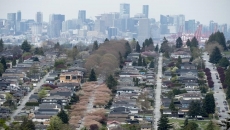The federal government could cut poverty rates by almost half in one year if it launched a basic income similar to one previously studied in Ontario, the parliamentary budget officer says.
Although nationally the drop in poverty rates under such a measure would be about 49 per cent, the reductions would vary across provinces.
PBO will release its report “Distributional and Fiscal Analysis of a National Guaranteed Basic Income” on April 7, 2021. #cdnecon #cdnpoli
— Parliamentary Budget Officer (@PBO_DPB) April 6, 2021
Budget officer Yves Giroux estimated that poverty rates could fall as much as 61.9 per cent in Manitoba or as little as 13.5 per cent in Newfoundland and Labrador if the federal government instituted the program.
At its core a basic or guaranteed income provides a no-strings-attached government benefit to citizens to provide each with a minimum amount of earnings.
Four years ago, Ontario began studying the effects of providing people with enough money to be about three-quarters of the way to the poverty line, and rolling back payments for every dollar of earnings.
The study, which federal officials monitored closely, was ended early with a change of government in Ontario.
Giroux said a federal program modelled on what was set up in the Ontario experiment would cost an estimated $85 billion if implemented this fiscal year, rising to over $93 billion by 2026.
The budget officer's report released Wednesday updates his projections from last summer about the cost of a basic income program, and details the financial ripple effect across households and workers.
Driving the work were questions from parliamentarians about the effects of a basic income program, which has picked up political traction over the last year as the COVID-19 pandemic put the economy into a tailspin. At its worst, the pandemic cost the country about three million jobs and reduced hours and incomes for 2.5 million more.
The grassroots of the Liberal and New Democratic parties have put forward resolutions at their respective policy conventions to make a basic income a core policy. Although it may win approval when New Democrats gather, the Liberals are split on the proposal, with Prime Minister Justin Trudeau said to still be less-than-enthused with the idea.
Had there been in place a basic income program like the one Giroux modelled, the government would have paid about $17,000 to a single person, or $24,000 for a couple, and then taken off 50 cents for every dollar earned as incomes rose from there.
For the most part, Giroux estimated, disposable income would rise for those at the bottom of the income scale by 17.5 per cent, or just over $4,500, while those higher up the earnings scale would see their incomes drop slightly.
The reason for the drop would be another caveat in the modelling, that the federal government would remove refundable and non-refundable tax credits aimed at fighting poverty.
Overall, Giroux's report said more than 6.4 million people would see their disposable income rise as a result of a basic income program, on average by 49.6 per cent, while 16.8 million more would have their net income fall by 5.4 per cent.
Giroux's report also said that the interaction between tax rates, elimination of credits and earnings as part of basic income would make some workers rethink taking on additional employment hours if it meant losing income through a combination of paying more taxes and receiving fewer benefit dollars.
He estimated that overall, employees would reduce their hours worked by 1.3 per cent nationally, which would cost federal coffers between $3 billion and $3.3 billion annually over a five-year stretch due to lost revenues.



.jpg)


